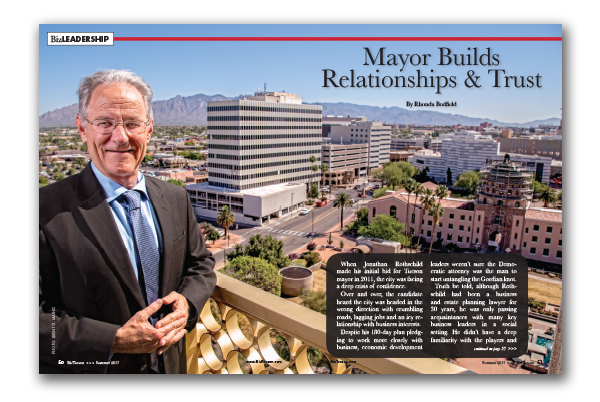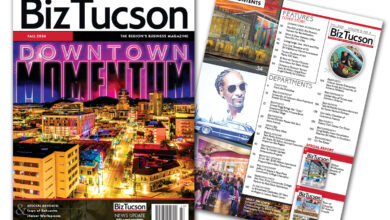
Mayor Jonathan Rothschild Builds Relationships and Trust
By Rhonda Bodfield –
When Jonathan Rothschild made his initial bid for Tucson mayor in 2011, the city was facing a deep crisis of confidence.
Over and over, the candidate heard the city was headed in the wrong direction with crumbling roads, lagging jobs and an icy relationship with business interests.
Despite his 180-day plan pledging to work more closely with business, economic development leaders weren’t sure the Democratic attorney was the man to start untangling the Gordian knot.
Truth be told, although Rothschild had been a business and estate planning lawyer for 30 years, he was only passing acquaintances with many key business leaders in a social setting. He didn’t have a deep familiarity with the players and wasn’t steeped in the issues they believed were barriers to growth.
The Tucson Metro Chamber picked another horse.
But the day after Rothschild handily swept the election, Chamber CEO Mike Varney received a call from the mayor-elect, inviting him to come to his office. The invite went something like this: “It’s time to roll up our sleeves and get to work. We’ve got a lot to do.”
“That was a demonstration of class I will always remember and it kicked off what has been a positive, productive relationship ever since,” Varney said.
Tony Penn, the president of United Way of Tucson and Southern Arizona who served as chair of the Tucson Metro Chamber for part of Rothschild’s tenure, similarly recalled those initial conversations – much of them focused on the slow, decidedly unsexy work of analyzing codes, certifications and licensing requirements. Processes were streamlined. Lag time was reduced.
“By showing itself to be a good partner to business – and accountable to taxpayers at the same time – the city has become a better environment for new businesses to plant a flag and for existing business to thrive,” Penn said, adding that the recent Bloomberg report calling out Tucson as having the country’s third-fastest job growth is evidence of the difference. “It’s very important that our economy is one that will attract business. I like to say the best remedy for poverty is a living-wage job.”
Rothschild acknowledged it took a lot of dialogue to begin establishing trust – and that worked both ways. “I really tried to communicate to city staff why sometimes the private sector can be frustrated with the public sector, but also tried to explain to the business community that there was a reason why public sector had to behave as it did. There was really a wariness from both sides.”
Rothschild persisted, committed to trying to come to a place of engagement. “That doesn’t mean we’re always going to agree,” he said, “but there needs to be a willingness to listen to other points of view, give everyone a say and find some compromise along the way.”
Of course, trust also comes with success – and the city has had some notable wins. Rio Nuevo’s evolution as a can-do redevelopment agency has created a new environment for their mutual work. Caterpillar came. The Roadrunners ice hockey team signed on. Downtown incentives evolved. The Tucson Convention Center hit the refresh button.
“Over time, what I learned,” said Rothschild, “was that if we’re going to be successful in building that business community – including attracting new business to town and helping the new businesses that were here – you have to work in partnerships, whether that’s with the county, with Sun Corridor, with Rio Nuevo.”
The change has been remarkable. Mark Irvin, who serves as the secretary of the Rio Nuevo board outside of his commercial real estate efforts, supported Rothschild in his first election. At the time, Irvin was dismayed at the toxic relationship between the city and his board – with the two entities embroiled in litigation and consumed by distrust.
“I told him, ‘Jonathan, I will support you on one condition – when you are elected, you’ll be part of the solution and will help Rio Nuevo and the City of Tucson settle our differences and move forward in a productive manner.’ He agreed. And he has not let me down. We’ve learned to work well together to really harness the horsepower of the community. It just took getting everyone on one page.”
Rothschild wrought converts from critics in three parts – open communication, coalition building and plain hard work. Stories are legion about emails time-stamped before 5 a.m. He’s usually in his office by 6:30 a.m. weekdays and on the go from there until 7:30 p.m., plus a half dozen weekend events and speaking engagements. Varney called him the hardest working mayor he’s ever met.
“You can’t punch a clock and be a good mayor,” Rothschild said. “To do this job right, you have to work like that. The trick is to make sure the things you’re working on re-energize you.”
One of those moments happened when the citizens supported the city’s road bond at the ballot. “It not only showed citizens were willing to place their trust back in city government,” Rothschild said, “but it also gave the city the opportunity to show we could be trusted. And we have. We’ve done what we said we were going to do.”
Ted Maxwell, president of the Southern Arizona Leadership Council, credits the Mayor with “continuously putting all he has into making Tucson a better place. No matter the issue he is addressing – whether it is finding a way to fix roads, encouraging kids to stay in school, helping homeless veterans or working to increase trade with Mexico – Jonathan Rothschild shows up and does all he can to make a difference.”
Rothschild has not been afraid to share big goals. When he took office, he said he wanted to make a difference in education – a statement that to some sounded hollow, given that the city council doesn’t have responsibility for school boards or funding for dry-erase markers and school buses. But the mayor worked with local districts to build a volunteer base to knock on doors to get kids back in school, to get tickets for families to experience the arts or to tie them more closely with social service programs. “Having a healthy education system is critical if you want to have a healthy business community,” Rothschild said.
For Lea Márquez-Peterson, president and CEO of the Tucson Hispanic Chamber of Commerce, that kind of willingness to collaborate to achieve hard goals is admirable. “The mayor has a white board in his office where he very visibly keeps his priorities and goals,” Márquez-Peterson said. “Even with all the notes and the circles, there’s a real transparency in what direction he’s going. I stand there really pretty unabashedly and look at the board to figure out where I fit in there. I applaud that kind of openness.”
She’s also been impressed with his work in building relationships – not just with other business interests and even working toward a more aligned city council – but with his focus on Mexico.
Joe Snell, president and CEO of Sun Corridor Inc., credits the mayor for his commitment to economic development. “Under Mayor Rothschild’s tenure, the City has developed a comprehensive economic development plan with a focus on talent, infrastructure and business environment. The City recognizes the importance of having a friendly, predictable business environment and a streamlined approach to development services and permitting processes, in order to be attractive to new and expanding businesses.”
When Bob Logan assumed leadership of the DM50 last year – a civic organization designed to support Davis-Monthan Air Force Base and its $1.5 billion impact to the local economy – one of his first official acts was to reach out to the Mayor. Borrowing a page from Clovis, New Mexico, which rallied to protect Cannon Air Force Base from a base closure round, DM50 was looking for a way to demonstrate community support for the base through a multi-pronged community effort.
“Mayor Rothschild is a great partner. Today business, nonprofits and the public sector are working together to provide a Youth Center for Excellence for the youth on base. Whether from an advocacy standpoint, or just assisting in helping us clear any bureaucratic obstacles we may encounter, we are very appreciative of his 100-percent engagement on this important initiative.”
Rothschild said he has no intention of coasting on the string of recent victories. He rattled off a list of new goals, including issuing a call for strengthening community-based mentoring for kids in need. Mentors ideally would supplement the work being done by youth advocacy nonprofits and would potentially serve as role models who would steer youngsters to internships and summer programs and good decisions along their journey to college.
“We’re always looking for ways to be better,” he said. “Sometimes it’s a question of being efficient, quicker. Sometimes it’s a question of building alignment, such as the work we’re doing with the county. A lot of the time, it’s just about continuing to develop the economic development infrastructure of our community. Everyone is out there hustling to get the same business. We have to put in real effort if we’re going to be successful.”





